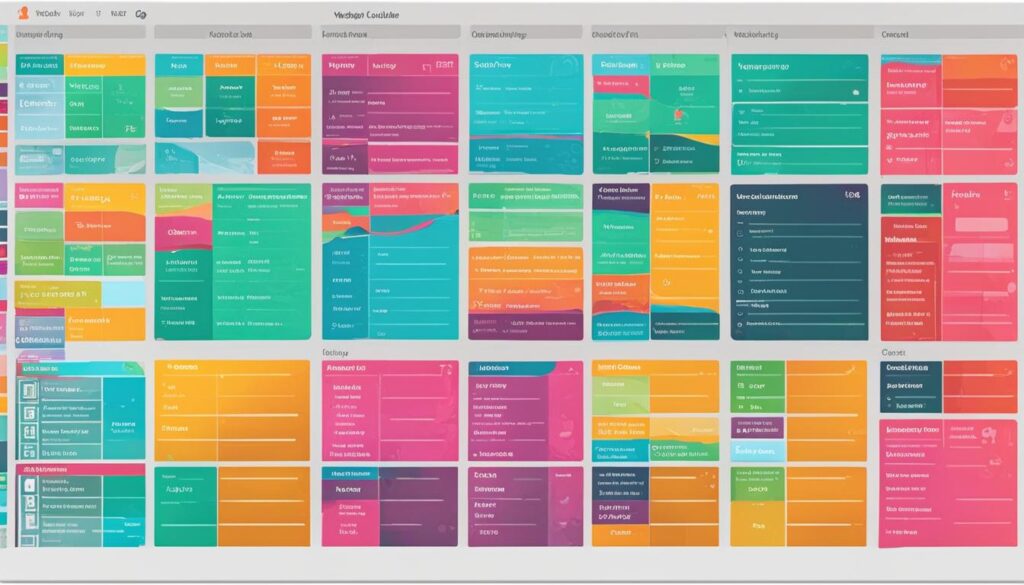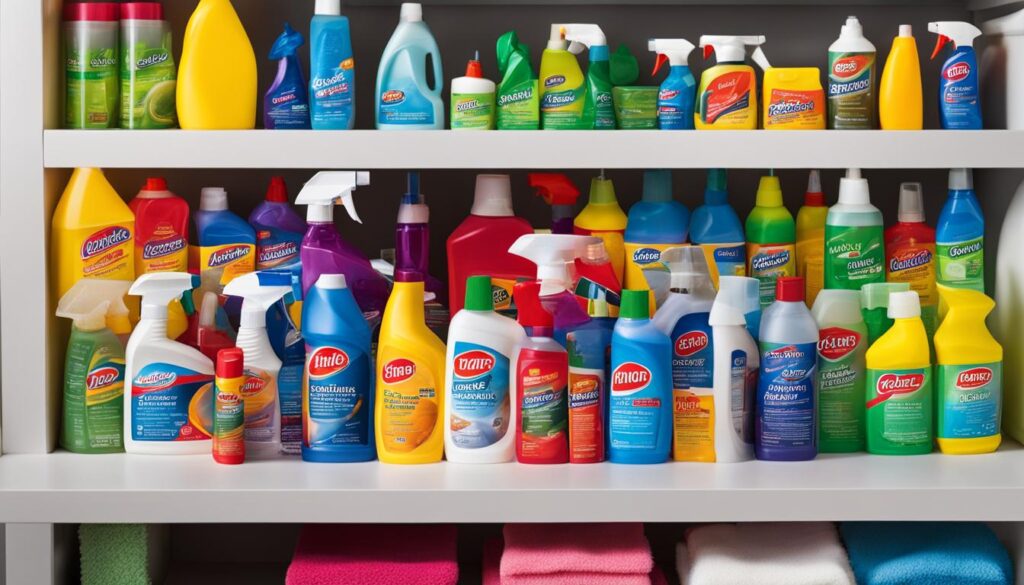Beginners Guides
Ultimate Guide to Cleaning Resources for Homes
2025

Welcome to our complete guide to all the cleaning resources, tips, and hacks you need to keep your home clean and organized. Whether you are a cleaning fanatic or simply someone who wants to maintain a tidy living space, we have everything you need. From essential cleaning supplies to establishing a cleaning schedule, we will offer you valuable insights and expert advice to make your cleaning routine a breeze.
Key Takeaways:
- Discover a wide range of cleaning resources, tips, and hacks to maintain a clean and organized home.
- Learn about essential cleaning supplies that will help you tackle any cleaning task effectively.
- Understand how to create a cleaning schedule and incorporate daily, weekly, and monthly cleaning tasks into your routine.
- Get practical advice on where to start when faced with a messy house and how to approach whole house cleaning.
- Explore useful resources, such as professional cleaning services and commercial cleaning tools, for additional support.
Basic Cleaning Supplies
When it comes to keeping your home clean, having the right cleaning supplies is essential. We’ve compiled a list of basic cleaning tools and products that will help you tackle any cleaning task with ease.
Cleaning Tools
- Brooms: A broom is perfect for sweeping away dirt, dust, and debris from hard floors.
- Vacuums: Invest in a reliable vacuum cleaner to effectively remove dirt and pet hair from carpets and rugs.
- Mops: Whether you prefer a traditional mop or a microfiber mop, both are great for cleaning hard floors.
- Microfiber cloths: These versatile cloths are ideal for dusting, wiping surfaces, and cleaning windows.
- Sponges: Use sponges for scrubbing stubborn stains and cleaning surfaces.
Cleaning Products
- Cleaning Solutions: Opt for multi-purpose cleaning solutions that are suitable for various surfaces in your home. Alternatively, white vinegar is a natural and effective cleaning agent.
Quote
Cleaning supplies are the backbone of any successful cleaning routine. By having the right tools and products on hand, you can ensure that your home remains clean and inviting.
Stay tuned for the next section where we’ll explore how often you should clean different areas of your home. With a solid arsenal of cleaning supplies, you’ll be ready to tackle any cleaning task that comes your way!
How often to clean
Cleaning tasks in your home can be categorized by how often they need to be done. By incorporating daily, weekly, and monthly cleaning tasks into your routine, you can maintain a clean and organized home. Here’s a breakdown of the different cleaning tasks:
Daily Cleaning Tasks:
- Wipe down surfaces, such as countertops and tables, to remove dust and dirt.
- Do the dishes and clean kitchen appliances after each use to maintain a tidy kitchen.
- Make your bed and remove any clutter from the bedroom to start the day with a clean space.
- Sweep or vacuum high-traffic areas to prevent dirt from accumulating.
Weekly Cleaning Tasks:
- Dust all surfaces, including furniture, shelves, and electronics, to eliminate allergens.
- Vacuum or mop all floors, paying extra attention to corners and hard-to-reach areas.
- Clean the bathroom, including the toilet, sink, shower, and bathtub, to maintain hygiene.
- Change bedding and wash all sheets, towels, and linens to keep them fresh.
Monthly Cleaning Tasks:
- Deep clean your kitchen appliances, such as the oven and refrigerator, to remove built-up grime.
- Wash windows and clean window sills to let in more natural light.
- Dust and wipe down ceiling fans, light fixtures, and vents to improve air quality.
- Organize and declutter closets, cabinets, and drawers to keep your space tidy.

Having a cleaning schedule that includes daily, weekly, and monthly tasks ensures that your home remains clean and organized throughout the year. Consistency is key to maintaining a welcoming and fresh living environment.
Where to Start Cleaning a House
If you’re facing a messy house and feeling overwhelmed, don’t worry, we’re here to help you get started on the fast all-over home cleaning process. By following a few simple cleaning steps, you can quickly transform your messy house into a clean and organized space.
Step 1: Clear the Clutter
The first step in fast all-over home cleaning is to pick up trash, gather dishes and laundry, and clear clutter. Start by grabbing a garbage bag and going through each room, disposing of any trash or items that don’t belong. Next, collect dirty dishes and laundry and put them in their respective places. Finally, clear any clutter from surfaces and floors, putting items back where they belong or finding a designated spot for them. This initial decluttering process will give you a clean slate to work with.
Step 2: Focus on High-Traffic Areas
Once you have cleared the clutter, prioritize the high-traffic areas of your home. These are the areas that are used most frequently and tend to get dirty quickly. Common high-traffic areas include entryways, living rooms, kitchen countertops, and bathrooms. Spend some time cleaning and organizing these areas to create an immediate visual improvement in your home.
Step 3: Move Room by Room
After addressing the high-traffic areas, move room by room to tackle the specific cleaning tasks. Start with one room and complete the cleaning tasks before moving on to the next. This approach will help you stay focused and make steady progress. Refer to our room-specific cleaning checklist, which provides detailed cleaning tasks for each area of your home.
Step 4: Utilize Time-Saving Techniques
Incorporate time-saving techniques into your cleaning routine to make the process more efficient. For example, use batch tasks, where you tackle similar cleaning tasks in multiple rooms at once, such as dusting or wiping down surfaces. This allows you to make the most of your time and energy.
By following these fast all-over home cleaning steps, you can effectively tackle a messy house and create a clean and organized living space. Remember, consistency is key, so strive to incorporate regular cleaning habits to maintain the cleanliness of your home.
| Cleaning Steps | Benefits |
|---|---|
| Clear the clutter | Creates a clean and organized space |
| Focus on high-traffic areas | Immediate visual improvement |
| Move room by room | Steady progress and focus |
| Utilize time-saving techniques | Efficient use of time and energy |
How to Create a Cleaning Schedule
A cleaning schedule is essential for maintaining a clean and organized home. It helps us stay on top of our cleaning tasks and ensures that no areas are overlooked. By following a weekly cleaning schedule, we can divide our cleaning tasks into manageable daily routines. Here’s how you can create a cleaning schedule that works for you:
1. Determine Your Cleaning Routine
Start by assessing your cleaning needs and preferences. Consider factors such as the size of your home, the number of occupants, and your daily schedule. Determine how often you want to clean each area of your home, whether it’s daily, weekly, or monthly.
2. Divide Tasks into Daily, Weekly, and Monthly Lists
Create a list of daily cleaning tasks, such as making the beds, doing the dishes, and wiping down surfaces. These tasks should be incorporated into your everyday routine. Next, create a weekly cleaning list that includes specific tasks for each day of the week. For example, Monday could be for dusting and vacuuming, while Tuesday is for cleaning bathrooms. Lastly, create a monthly cleaning list for tasks that require less frequent attention, like deep cleaning appliances or washing windows.
3. Utilize a Cleaning Checklist
A cleaning checklist is a useful tool to help you stay organized and track your progress. It ensures that you don’t miss any important cleaning tasks. You can create your checklist using a notebook, a whiteboard, or even a smartphone app. List all the tasks you need to complete for each day, and check them off as you go.
4. Customize Your Schedule
Remember, everyone’s cleaning needs are different. Tailor your schedule to suit your lifestyle and priorities. If you find that certain tasks are not manageable within your schedule, consider adjusting the frequency or delegating tasks to other family members.
“A cleaning schedule is like a roadmap to a clean and tidy home. It helps you stay organized, reduces stress, and ensures that nothing falls through the cracks.”
5. Stick to Your Schedule
Consistency is key when it comes to maintaining a clean home. Commit to following your cleaning schedule and make it a part of your daily routine. Set aside dedicated time for cleaning, and avoid procrastination. Remember, the more you stick to your schedule, the easier it becomes to stay on top of your cleaning tasks.
Creating a cleaning schedule and following it diligently is the secret to maintaining a clean and organized home. It helps us stay focused, ensures that no areas are neglected, and makes cleaning feel less overwhelming. So, start creating your cleaning schedule today and enjoy the benefits of a consistently clean and tidy living space.
| Day of the Week | Tasks |
|---|---|
| Monday | Dust and vacuum |
| Tuesday | Clean bathrooms |
| Wednesday | Mop floors |
| Thursday | Organize and declutter |
| Friday | Change bedding |
| Saturday | Clean kitchen |
| Sunday | Rest and relax |
Whole House Cleaning Tips
To efficiently clean your entire house, we have some valuable tips and techniques that can help. By implementing these strategies, you can achieve a whole house surface clean while saving time and energy.
- Start with a Quick Surface Clean: Begin by doing a quick surface clean throughout your home. This involves quickly wiping down countertops, dusting off surfaces, and tidying up any visible clutter. This initial step will give your house a cleaner appearance right from the start.
- Focus on One Room at a Time: Instead of trying to clean your entire house all at once, tackle one room at a time. By concentrating your efforts on one area, you can give it a thorough cleaning before moving on to the next. This approach helps to ensure that no corner is left untouched.
- Utilize Effective Cleaning Techniques: Incorporate efficient cleaning methods to optimize your cleaning routine. One technique is habit stacking, where you combine cleaning tasks with daily habits or routines. For example, you can wipe down bathroom surfaces while waiting for the shower to warm up or tackle dusting while listening to your favorite podcast. These time-saving tips can make your cleaning sessions more productive.
By following these whole house cleaning tips, you can achieve a surface clean in every room of your home. Remember to take breaks when needed and reward yourself for completing each room. Cleaning doesn’t have to be a tedious task when you have an effective plan in place.
Clearing the clutter and focusing on one room at a time can make cleaning your whole house more manageable.
Useful Resources
Sometimes, maintaining a clean home requires additional help or specialized resources. We understand that keeping a large or commercial space clean can be a daunting task. That’s why we recommend exploring the following options:
- Professional Cleaning Services: If you’re in need of a thorough deep clean, consider hiring professional cleaning services. These experts have the knowledge, experience, and equipment to ensure your space is impeccably clean. They can tackle even the toughest cleaning challenges, providing you with peace of mind and a spotless environment.
- Commercial Cleaning Resources: For businesses or larger spaces, commercial cleaning resources are essential. These resources cater specifically to the unique needs of commercial environments, offering specialized tools and techniques. From industrial-strength cleaning products to advanced equipment, commercial cleaning resources can help you maintain a clean and professional setting.
- Janitorial Resources: Janitorial resources are invaluable for facilities management and maintenance. These resources encompass a wide range of products and solutions that ensure cleanliness, hygiene, and safety. From cleaning chemicals to restroom supplies, janitorial resources help you maintain a clean and welcoming environment for employees, customers, or visitors.
By leveraging professional cleaning services, commercial cleaning resources, and janitorial resources, you can save time, effort, and ensure your space is consistently clean and well-maintained. Whether it’s a deep clean, specialized tools, or general maintenance supplies, these resources are designed to make your cleaning tasks easier and more efficient.
In the next section, we’ll explore how often you should schedule deep cleaning sessions to keep your home or business in top shape.
How often should you deep clean?
Deep cleaning is an essential part of maintaining a clean and healthy home environment. While regular cleaning tasks focus on day-to-day tidying and surface-level cleaning, deep cleaning goes beyond to tackle hidden dirt, dust, and grime. Many people associate deep cleaning with spring cleaning, but it is important to note that deep cleaning can be done at any time of the year.
The frequency of deep cleaning depends on various factors, including personal preferences and the size of your home. However, as a general guideline, it is recommended to deep clean your home at least once a year. This annual deep cleaning session allows you to thoroughly clean areas that may not receive regular attention during routine cleaning. By dedicating time to deep clean, you can ensure a healthier and more comfortable living space for you and your family.
The Benefits of Regular Deep Cleaning
Regular deep cleaning offers several benefits for both your home and your well-being:
- Eliminates allergens: Deep cleaning helps remove allergens such as dust, pet dander, and pollen, promoting better indoor air quality and reducing allergy symptoms.
- Prevents mold and mildew: Deep cleaning in areas prone to dampness, such as bathrooms and basements, helps prevent the growth of mold and mildew, which can cause health issues.
- Extends the lifespan of surfaces: Deep cleaning removes dirt and grime that can cause wear and tear on surfaces, helping them retain their beauty and durability.
- Enhances overall cleanliness: Deep cleaning ensures a thorough and comprehensive cleaning of your home, making it look and feel fresh and inviting.
Remember, deep cleaning isn’t just a one-time task. It is important to incorporate it into your cleaning routine to maintain a consistently clean and healthy home.
Deep cleaning goes beyond the surface, addressing hidden dirt and allergens, and promoting a healthier living environment.
Creating a Deep Cleaning Schedule
To ensure that your home receives regular deep cleaning, consider creating a deep cleaning schedule. This schedule can be flexible and tailored to your specific needs and preferences. Here’s an example of how you can incorporate deep cleaning into your cleaning routine:
| Frequency | Tasks |
|---|---|
| Monthly | Deep clean kitchen appliances, including the oven and refrigerator. |
| Quarterly | Deep clean carpets, upholstery, and curtains. |
| Semi-annually | Deep clean windows, window sills, and blinds. |
| Annually | Deep clean hard-to-reach areas, such as behind appliances and furniture, as well as ceilings and light fixtures. |
Keep in mind that this schedule is just a starting point. Adjust it based on your specific needs and the areas of your home that require extra attention.
By incorporating regular deep cleaning into your cleaning routine, you can enjoy a cleaner, healthier, and more comfortable home. Deep cleaning not only improves the appearance of your living space but also promotes a healthier environment for you and your loved ones.
Before getting started
Before diving into your deep cleaning session, it’s crucial to take a moment to prepare yourself for success. By setting goals, practicing effective time management, and gathering all the necessary cleaning supplies and equipment, you can streamline your cleaning process and make it more efficient. This section will guide you through the essential steps to ensure a smooth and productive cleaning session.
Setting Goals
Begin by identifying your cleaning goals. Are you aiming for a comprehensive top-to-bottom cleaning or focusing on specific areas of your home? Clarifying your objectives will help you prioritize tasks and allocate time accordingly. Whether it’s decluttering, disinfecting, or organizing, having a clear vision of what you want to achieve will keep you motivated throughout the process.
Time Management
Effective time management is key to maximizing your productivity during the cleaning session. Start by estimating how much time you can dedicate to the task and create a realistic schedule. Break down your cleaning tasks into smaller chunks and allocate specific time slots for each. This will prevent you from feeling overwhelmed and ensure that you stay on track. Remember to take short breaks to rest and recharge, maintaining your energy levels throughout the cleaning process.
Preparing Cleaning Supplies and Equipment
Gather all the cleaning supplies and equipment you’ll need before embarking on your cleaning journey. Having everything at arm’s reach saves time and prevents frequent interruptions. Ensure you have an ample supply of cleaning solutions, microfiber cloths, brushes, gloves, and any other tools specific to your cleaning requirements. This way, you can seamlessly move from one task to another without pausing to search for missing items.
Stay organized, focused, and efficient
By setting goals, managing your time effectively, and preparing all the necessary cleaning supplies and equipment, you’ll be well-prepared to tackle your cleaning tasks efficiently. Keep these essential steps in mind as you embark on your deep cleaning session, and you’ll be on your way to achieving a clean and refreshed home in no time.
A checklist of things you’ll need
To effectively deep clean your home, you’ll need a variety of cleaning supplies and equipment.
Here’s a comprehensive checklist of the essential items:
| Cleaning Supplies | Cleaning Equipment | Household Items |
|---|---|---|
|
|
|
With these items on hand, you’ll be equipped to tackle every corner of your home and achieve a thorough deep cleaning.
Internal Home Cleaning Checklist
Cleaning each room in your home requires specific tasks to be completed. From dusting and vacuuming to organizing and disinfecting, each room has its own set of cleaning needs. Utilize a room-specific cleaning checklist to ensure you don’t miss any important tasks.
Kitchen Cleaning Checklist
- Clear clutter from countertops
- Wipe down surfaces and countertops
- Clean and disinfect sink
- Clean stove and oven
- Wipe down appliances
- Sweep and mop floors
Bathroom Cleaning Checklist
- Clean and disinfect toilet
- Scrub bathtub and shower
- Wipe down sink and countertops
- Clean mirrors
- Empty and clean trash can
- Sweep and mop floors
Bedroom Cleaning Checklist
- Dust surfaces and furniture
- Vacuum or mop floors
- Change bed sheets
- Organize and declutter
- Clean windows and mirrors
- Air out the room
Living Room Cleaning Checklist
- Dust surfaces and furniture
- Vacuum or mop floors
- Vacuum upholstery and clean stains
- Clean electronic devices
- Organize and declutter
- Clean windows and blinds
Home Office Cleaning Checklist
- Dust surfaces and furniture
- Vacuum or mop floors
- Organize documents and desk
- Clean computer screens and keyboards
- Clean windows and blinds
- Empty and clean trash can
| Room | Cleaning Tasks |
|---|---|
| Kitchen | Dust, wipe down surfaces, clean appliances, sweep and mop floors |
| Bathroom | Clean and disinfect toilet, scrub bathtub and shower, wipe down sink and countertops, sweep and mop floors |
| Bedroom | Dust surfaces, vacuum or mop floors, change bed sheets, organize and declutter |
| Living Room | Dust surfaces, vacuum or mop floors, vacuum upholstery, organize and declutter |
| Home Office | Dust surfaces, vacuum or mop floors, organize documents and desk, clean computer screens and keyboards |
External Home Cleaning Checklist
When it comes to maintaining a clean and well-maintained home, don’t forget about the exterior! Outdoor cleaning and yard maintenance are essential tasks that should be included in your regular cleaning routine. By following this external home cleaning checklist, you can ensure that your home’s exterior remains in pristine condition.
Tasks to Include in Your External Home Cleaning Checklist:
- Sweeping porches, walkways, and driveways to remove dirt, debris, and leaves.
- Clearing cobwebs from eaves, windows, and outdoor light fixtures. Spiders love to create their webs in these areas.
- Cleaning outdoor furniture, including tables, chairs, and cushions, to remove dirt and stains.
- Washing windows and glass surfaces to remove dirt, smudges, and fingerprints.
- Pressure washing the exterior of your home to remove built-up dirt and grime.
- Inspecting and cleaning gutters to prevent clogs and ensure proper drainage.
- Trimming trees, shrubs, and hedges to maintain a neat and tidy appearance.
- Removing weeds from driveways, sidewalks, and garden beds.
- Maintaining your lawn by mowing the grass and watering as needed.
By regularly completing these exterior cleaning tasks, you can enhance the curb appeal of your home and create a welcoming outdoor space. Remember, a clean and well-maintained exterior is not only visually appealing but also contributes to the overall longevity of your home.
Image:
Things to Remember
As you embark on your cleaning journey, there are some important things to keep in mind. By following the below tips and tricks, you can make your cleaning routine more effective, enjoyable, and efficient.
1. Take off your shoes indoors
Encourage everyone in your household to remove their shoes before entering the house. This simple practice helps prevent dirt and outdoor pollutants from spreading throughout your home, reducing the frequency and intensity of cleaning tasks.
2. Play music or podcasts
Make cleaning more enjoyable by playing your favorite music or podcasts while you work. Music can boost your mood and energy levels, making the cleaning process feel more fun and less like a chore. Alternatively, you can catch up on your favorite podcasts or audiobooks, turning cleaning time into an opportunity for entertainment and personal growth.
3. Use efficient cleaning techniques
Maximize your cleaning effectiveness by employing efficient techniques, such as batch tasks. Instead of cleaning room by room, focus on completing similar tasks together. For example, dusting all surfaces in one go or vacuuming the entire house in one session. This approach minimizes wasted time and ensures a more streamlined cleaning process.
| Tips | Tricks | Effective Cleaning Practices |
|---|---|---|
| Take off your shoes indoors | Play music or podcasts | Use efficient cleaning techniques |
For the Pros: Cleaning Checklist Essentials for Businesses
As professional cleaners or owners of a cleaning business, having a comprehensive cleaning checklist is vital for delivering exceptional services. A well-structured checklist ensures that no cleaning task is overlooked and helps maintain consistency and professionalism. Here are the essential elements to consider when creating a cleaning checklist for your commercial cleaning services:
Pre-Cleaning Preparations
Before starting any cleaning job, it’s important to be well-prepared. This includes gathering all the necessary cleaning supplies and equipment, such as mops, brooms, vacuum cleaners, and cleaning solutions. Additionally, make sure to assess the specific cleaning requirements of each area or facility to tailor your checklist accordingly.
Specific Tasks for Each Area
Commercial spaces have diverse areas that require specialized cleaning attention. Develop a checklist that outlines unique tasks for different zones, such as reception areas, offices, restrooms, break rooms, and conference rooms. This ensures that all areas are thoroughly cleaned and maintained to the highest standards.
Professionalism and Courtesy
When providing commercial cleaning services, professionalism and courtesy are key. Train your staff to adhere to a set of standards, including wearing proper uniforms or attire, using non-disruptive cleaning techniques, and maintaining a friendly and approachable demeanor. These elements contribute to a positive experience for both employees and clients.
Post-Cleaning Inspections
After completing a cleaning job, conduct post-cleaning inspections to ensure that all tasks have been successfully accomplished. Regular inspections form an essential part of quality control and allow you to address any overlooked areas or potential issues promptly. This step demonstrates your commitment to delivering excellent cleaning services and reinforces client satisfaction.
To provide a clearer understanding of the elements mentioned above, here’s an example of how a commercial cleaning checklist can be structured:
| Area | Tasks |
|---|---|
| Reception Areas |
|
| Restrooms |
|
| Offices |
|
| Break Rooms |
|
| Conference Rooms |
|
By following a comprehensive cleaning checklist, you can ensure that your commercial cleaning services are carried out efficiently and effectively. Consistency, attention to detail, and professionalism are key factors in building a loyal client base and establishing a successful cleaning business.
Note: The checklist provided above is a basic example and should be tailored to meet the specific requirements of your cleaning business and client needs.
Conclusion
Maintaining a clean and organized home is crucial for your overall well-being. With the house cleaning resources, tips, and hacks provided in this guide, you can create a cleaning routine that keeps your home pristine. Whether you’re tackling daily tasks or deep cleaning sessions, these resources will help you maintain a clean and inviting space.
By utilizing the right cleaning supplies, following a cleaning schedule, and employing effective cleaning techniques, you can ensure that your home remains fresh and tidy. Remember to start with a fast all-over home cleaning to create a clean slate, and then focus on room-specific tasks using comprehensive checklists.
Additionally, it’s important to remember that maintaining a clean home goes beyond just the interior. Outdoor cleaning and yard maintenance are equally important for a well-kept home. Incorporate external home cleaning tasks into your routine, such as sweeping porches and walkways, clearing cobwebs, and cleaning outdoor furniture.
By following this cleaning guide and employing the tips and tricks provided, you can create a clean and organized living environment. So, roll up your sleeves, grab your cleaning supplies, and start your journey towards a cleaner, healthier, and more inviting home. Yes, you can use cleaning resources for homes to care for your Monstera Adansonii plant. However, you must be cautious and avoid using products containing harsh chemicals or fragrances. For a comprehensive guide to Monstera Adansonii care, consult a reputable source for plant care tips. Essential cleaning supplies include brooms, vacuums, mops, microfiber cloths, sponges, and cleaning solutions like white vinegar. It is recommended to incorporate daily tasks like wiping down surfaces into your routine. Additionally, weekly and monthly tasks like dusting, vacuuming, and deep cleaning should be done consistently to maintain a clean home. Start with a fast all-over home cleaning, which involves picking up trash, gathering dishes and laundry, and clearing clutter. Once you have a clean slate, you can focus on specific cleaning tasks in each room. Creating a cleaning schedule helps you stay organized and ensures that no tasks are overlooked. You can create a weekly cleaning schedule that includes daily tasks as well as specific tasks for each day of the week. Utilize cleaning checklists to stay on track. Start with a quick surface clean, focus on one room at a time, and use efficient cleaning methods like habit stacking. By following these tips, you can keep your entire house clean in a time-saving manner. Yes, professional cleaning services offer deep cleaning solutions, while commercial cleaning resources and janitorial resources provide specialized tools and techniques. These resources can be especially helpful for large or commercial spaces. It is recommended to deep clean at least once a year. However, the frequency of deep cleaning depends on your preferences and the size of your home. Set yourself up for success by identifying your goals, managing your time effectively, and preparing all the necessary cleaning supplies and equipment. You’ll need rubber gloves, cleaning solutions, sponges, brushes, brooms, vacuums, and more. Having a comprehensive checklist of these items will ensure you have everything you need for a successful deep cleaning session. Yes, each room in your home has its own set of cleaning needs, such as dusting, vacuuming, organizing, and disinfecting. Utilize a room-specific cleaning checklist to ensure you don’t miss any important tasks. Tasks like sweeping porches and walkways, clearing cobwebs, and cleaning outdoor furniture are part of external home cleaning. Following an external home cleaning checklist will help you stay on top of these important tasks. Take off your shoes indoors, play music or podcasts to make cleaning more enjoyable, and use efficient cleaning techniques like batch tasks. These tips and tricks will make your cleaning routine more effective and enjoyable. Yes, a detailed cleaning checklist is essential for professional cleaners or those running a cleaning business. It includes pre-cleaning preparations, specific tasks for each area, professionalism and courtesy, and post-cleaning inspections to ensure top-notch cleaning services. By utilizing the cleaning resources, tips, and hacks provided in this guide, you can create a cleaning routine that keeps your home pristine. Whether you’re tackling daily tasks or deep cleaning sessions, these resources will help you maintain a clean and inviting space.Can I Use Cleaning Resources for Homes to Care for My Monstera Adansonii Plant?
FAQ
What are some basic cleaning supplies I should have?
How often should I clean my home?
Where should I start when cleaning a messy house?
How do I create a cleaning schedule?
What are some whole house cleaning tips?
Are there any useful cleaning resources available?
How often should I deep clean my home?
What should I do before getting started with deep cleaning?
What do I need for a deep cleaning session?
Are there room-specific cleaning tasks I should be aware of?
How do I clean the exterior of my home?
What are some important things to remember when cleaning?
Do you have a cleaning checklist for businesses?
How can I maintain a clean and organized home?
Source Links
- https://fieldcomplete.com/blog/all-topics/the-complete-house-cleaning-guide-checklists-and-tips-for-every-home
- https://thehappierhomemaker.com/ultimate-home-cleaning-guide-2021/
- https://greatcoloradohomes.com/blog/the-ultimate-home-deep-cleaning-checklist-and-guide.html
- About the Author
- Latest Posts
Introducing Charles, the Editor in Chief at ByRetreat, whose passion for interior design and editorial excellence elevates every remote workspace to new heights. With his keen eye for detail, impeccable taste, and expertise in design, Charles brings a wealth of knowledge and creativity to the ByRetreat team.
As the Editor in Chief of a renowned lifestyle blog, Charles has honed his skills in curating captivating content and staying up-to-date with the latest trends in interior design. His deep understanding of aesthetics and the power of storytelling through design enables him to create remote workspaces that are not only visually stunning but also rich in personality and meaning.
Beginners Guides
Best Time to Cruise Alaska for Wildlife Enthusiasts
Fascinated by wildlife? Discover why July is the ultimate time to cruise Alaska for unforgettable wildlife encounters.

If you're a wildlife enthusiast planning an Alaska cruise, choosing the best time to go is like picking the ripest fruit from the tree. July, known as the prime month for wildlife viewing, offers a chance to witness nature's majestic spectacle in full swing.
But the question remains, what makes this time so special for wildlife enthusiasts? Stay tuned to uncover the secrets of Alaska's peak wildlife season and discover why July stands out as the prime time for wildlife sightings in this breathtaking region.
Key Takeaways
- Peak wildlife viewing in Alaska occurs from late July to early September.
- Bears are active near salmon-rich areas during this period.
- Humpback whales and killer whales are commonly spotted in Alaskan waters.
- Steller sea lions and bald eagles offer year-round wildlife sightings.
Optimal Months for Wildlife Viewing
When planning a cruise through Alaska for best wildlife viewing, it's important to think about the peak months of July through early September. During these months, bears are drawn to salmon-rich creeks and streams, offering a remarkable opportunity to witness these majestic creatures in their natural habitat. Additionally, this period presents best conditions for spotting humpback whales and killer whales near popular ports like Ketchikan, Juneau, and Seward. Steller sea lions can be observed up close from early spring to late July, adding to the diverse wildlife experience.
Bald eagles, with a significant population in Alaska, are commonly seen near bodies of water year-round. Their presence enriches the birdwatching opportunities, especially in southeast Alaska. To make the most of wildlife sightings during an Alaska cruise, staying flexible is key. Captains often announce wildlife sightings, and participating in guided wildlife tours can further enhance the overall experience. Being prepared and adaptable makes sure that every wildlife encounter is maximized during the journey.
Peak Wildlife Season in Alaska

During the peak wildlife season in Alaska, late July to early September provides unparalleled opportunities to observe a diverse array of wildlife species in their natural habitats. Bears, moose, whales, and other wildlife can be readily spotted during this time.
Here are some key points to take into account during the peak wildlife season in Alaska:
- Bears are actively feeding before hibernation, making sightings more frequent.
- Various species of whales, such as humpback whales and killer whales, are commonly seen in Alaskan waters.
- The fall salmon run attracts bears and other predatory species to the shorelines, offering unique wildlife viewing experiences.
- Moose are often seen during this season, showcasing their majestic presence in the Alaskan wilderness.
Exploring Alaska during late July to early September not only allows for best wildlife viewing but also provides a chance to witness the intricate interactions between different species in their natural environment.
Best Time for Wildlife Enthusiasts
Ideal wildlife viewing opportunities in Alaska are enhanced during specific periods when various species exhibit distinct behaviors and patterns.
From July through early September, Southeast Alaska becomes a hotspot for bear sightings as the salmon run attracts them to creeks and streams. This period offers a remarkable chance to witness bears in their natural habitat, feasting on the abundant fish.
Humpback whales frequent Alaskan waters during the peak summer months, showcasing their majestic behaviors such as breaching and feeding.
Steller sea lions, a year-round attraction in Alaska, are best observed from early spring through the end of July when they gather in haulouts along the coast.
Bald eagles, with a significant population in Alaska, can be spotted year-round in Southeast Alaska, soaring through the skies or perched near water bodies.
For birdwatching enthusiasts, Southeast Alaska provides diverse opportunities with approximately 470 bird species to be observed throughout the region. Witnessing these magnificent creatures in their natural habitat during these times offers a truly immersive wildlife experience.
Prime Wildlife Viewing Periods

In the prime wildlife viewing periods of Alaska, from July through early September, a myriad of opportunities awaits wildlife enthusiasts seeking unforgettable encounters with the region's diverse fauna. During this time, bears are drawn to the salmon-rich creeks and streams, providing a thrilling spectacle for visitors.
July stands out as an exceptional month for wildlife observation, offering prime chances to spot bears, whales, and various marine life species in their natural habitats. As late summer changes into early fall, from late July to late September, the wildlife activity peaks, with bears actively preparing for hibernation and engaging in behaviors essential for their survival.
Additionally, the fall salmon runs in September attract a plethora of wildlife, from bears to other predatory species, creating excellent viewing experiences along the shorelines. Those exploring Alaska in October are treated to an increase in sightings of majestic gray whales, alongside the graceful Bowhead and Beluga whales, adding to the richness of the wildlife encounters during this period.
Top Months for Wildlife Sightings
Our observations indicate that the top months for wildlife sightings in Alaska typically span from July through early September, coinciding with the peak of wildlife activity and best viewing opportunities. During this period, bears are commonly sighted in Southeast Alaska as they're drawn to creeks and streams by the salmon influx, providing a remarkable chance to witness these majestic creatures in their natural habitat.
Humpback whales grace the waters of Alaska during the peak summer months, offering fantastic viewing experiences, while killer whales are frequently spotted near Ketchikan, Juneau, and Seward in May and June.
Steller sea lions, a year-round attraction in Alaska, are best observed from early spring through the end of July, showcasing their impressive presence along the coastline. Similarly, sea otters can be seen throughout the year near streams and creeks, adding to the diverse wildlife spotting opportunities. Bald eagles, with around 30,000 individuals calling Alaska home, are a common sight near bodies of water, making any time of year ideal for eagle enthusiasts.
To make the most of wildlife spotting, flexibility, binoculars, and staying alert for wildlife announcements are essential for a fulfilling Alaskan cruise experience.
Conclusion
Thus, July truly shines as the crown jewel of wildlife viewing in Alaska for enthusiasts.
The peak season offers a vibrant tapestry of wildlife sightings, from majestic whales breaching in the waters to bears feasting on salmon in the streams.
It's a symphony of nature's beauty, where each creature plays its own unique melody in the grand orchestra of the Alaskan wilderness.
- About the Author
- Latest Posts
Introducing Ron, the home decor aficionado at ByRetreat, whose passion for creating beautiful and inviting spaces is at the heart of his work. With his deep knowledge of home decor and his innate sense of style, Ron brings a wealth of expertise and a keen eye for detail to the ByRetreat team.
Ron’s love for home decor goes beyond aesthetics; he understands that our surroundings play a significant role in our overall well-being and productivity. With this in mind, Ron is dedicated to transforming remote workspaces into havens of comfort, functionality, and beauty.
Beginners Guides
The Best Time to Go on a Cruise for Perfect Weather
Sail through the maze of climate patterns to uncover the best times for perfect weather on a cruise, ensuring a memorable voyage awaits.

When it comes to choosing the best time to go on a cruise for perfect weather, it's like steering a maze of climate patterns to find that golden ticket. But fear not, as we have the compass to guide you in the right direction.
Understanding the seasonal nuances can make all the difference between a sun-kissed voyage and a rainy retreat. So, grab your sunscreen and pack your bags as we uncover the best times to set sail for idyllic weather conditions that will make your cruise a memorable experience.
Key Takeaways
- Caribbean cruises: December to mid-April for best weather conditions
- Alaskan cruises: Late June to mid-July for breathtaking landscapes
- Mediterranean cruises: April-May & September-October for ideal weather
- Hawaii cruises: Summer and fall months for dry weather and sunny skies
Ideal Months for Caribbean Cruises
For ideal weather conditions and a pleasant cruising experience in the Caribbean, consider booking your voyage between December and mid-April. During this period, the Caribbean boasts the best weather for cruises, with dry conditions and sunny skies prevailing. This stretch offers a fantastic opportunity to soak up the sun, enjoy water activities, and explore the stunning destinations in the region without the worry of rainstorms or excessive humidity.
Late summer into fall presents the cheapest time for Caribbean cruises, making it an excellent choice for budget-conscious travelers looking to experience the beauty of the Caribbean without breaking the bank. By opting for a cruise during this period, you can take advantage of lower prices and fewer crowds while still enjoying the warm waters and picturesque landscapes the Caribbean is known for.
Avoiding the peak season from December to April is advisable for those seeking a more peaceful and wallet-friendly experience. Sailing in late June through August allows travelers to steer clear of the crowds, particularly families on vacation during school breaks, making for a more relaxed and intimate cruise experience.
Optimal Weather for Alaskan Cruises

To maximize your Alaskan cruise experience, targeting late June through mid-July guarantees ideal weather conditions for enjoying the breathtaking landscapes and wildlife sightings in the region. During mid-July, you can witness the spectacular salmon run season, where various wildlife, including bears and bald eagles, gather along the rivers for this perfect phenomenon.
Late August to mid-September is another excellent window for Alaskan cruises, offering pleasant weather and often lower prices as it marks the end of the peak season. If your focus is on spotting whales, August is the prime time for your cruise, as these majestic creatures are commonly seen during this period.
For those seeking a balance between affordability and decent weather, mid-May to early June also presents a good opportunity to explore Alaska on a cruise. Keep these ideal weather periods in mind when planning your Alaskan adventure for an unforgettable experience.
Perfect Seasons for Mediterranean Cruises
April-May and September-October stand out as the prime seasons for Mediterranean cruises, offering ideal weather conditions and fewer crowds for a delightful experience exploring the region. During these shoulder seasons, the Mediterranean boasts milder temperatures and a more relaxed atmosphere compared to the peak tourist season in July and August. Traveling in April or May allows for pleasant sightseeing without the sweltering heat or overwhelming crowds. Likewise, September and October provide a serene setting for cruising with comfortable weather and less tourist congestion.
Additionally, prices for Mediterranean cruises tend to be lower from May to November, making it a cost-effective option for travelers seeking a budget-friendly voyage. Consider booking a Mediterranean cruise in May 2024 with MSC starting at $499/person to enjoy the perfect blend of favorable weather and affordable prices.
- Ideal weather conditions
- Fewer crowds
- Milder temperatures
- Lower prices during shoulder seasons
- Peak tourist season in July and August
Prime Time for Hawaii Cruises

The best time to start on a Hawaii voyage is usually during the summer and fall months when the weather is dry and the skies are sunny. Hawaii cruises are particularly rewarding from mid-September through October, offering ideal conditions for a memorable experience. If you're interested in whale watching, the period from late October through May is perfect for spotting these majestic creatures in their natural habitat. During this time, the weather remains pleasant, with minimal rainfall from August through October, ensuring a smooth sailing experience.
For travelers seeking a cost-effective option, January through March can be a good time to contemplate a Hawaii cruise, although weather conditions may vary slightly. These months often offer competitive pricing and fewer crowds, allowing you to enjoy the beauty of Hawaii at a more relaxed pace. Whether you're into adventure, relaxation, or simply soaking in the stunning scenery, a Hawaii cruise during the summer and fall months promises an unforgettable journey.
Best Weather for Australia & New Zealand Cruises
For those considering voyages beyond Hawaii, exploring the best weather for Australia & New Zealand cruises becomes paramount, especially as these regions offer unique experiences throughout the year. When planning your cruise to Australia and New Zealand, keep in mind the following key points for an enjoyable voyage:
- November to March: This period offers warm temperatures and sunny weather in major ports like Sydney, making it the best time to go on a cruise in Australia & New Zealand.
- Early February to mid-March: Experience the warmest weather in Australia during these months, ensuring a comfortable cruise.
- New Zealand's Climate: With a temperate climate, layering is recommended for cruises throughout the year to stay comfortable.
- Consider Off-Peak Months: October, November, or April can provide discounted fares in Australia outside the peak season, allowing for savings on your cruise.
- Reversed Seasons: Australia and New Zealand have reversed seasons compared to the northern hemisphere, influencing the ideal timing for a cruise in these regions.
Planning your trip around these factors will help you make the most of your cruise experience in Australia and New Zealand.
Conclusion
To guarantee the best time to go on a cruise for perfect weather is essential for a memorable and enjoyable experience. By researching the ideal months for different regions like the Caribbean, Alaska, Mediterranean, Hawaii, Australia, and New Zealand, you can secure smooth sailing and sunny skies.
Don't just take our word for it, investigate the truth of this theory yourself and discover the magic of cruising in ideal weather conditions.
- About the Author
- Latest Posts
Introducing Ron, the home decor aficionado at ByRetreat, whose passion for creating beautiful and inviting spaces is at the heart of his work. With his deep knowledge of home decor and his innate sense of style, Ron brings a wealth of expertise and a keen eye for detail to the ByRetreat team.
Ron’s love for home decor goes beyond aesthetics; he understands that our surroundings play a significant role in our overall well-being and productivity. With this in mind, Ron is dedicated to transforming remote workspaces into havens of comfort, functionality, and beauty.
Beginners Guides
The Best Time to Cruise for Budget-Friendly Deals
Fulfill your wanderlust dreams without draining your wallet by learning the key to scoring budget-friendly cruise deals.

When it comes to finding budget-friendly cruise deals, timing is key. Imagine setting sail on the crystal blue waters of the Caribbean or exploring the stunning glaciers of Alaska without breaking the bank.
There's a specific window of opportunity that savvy cruisers keep an eye on to secure the best rates and save some serious cash. But how do you know when to book your next adventure to make the most of your budget?
Let's uncover the secrets behind scoring the ultimate cruise deals and making your dream vacation a reality.
Key Takeaways
- Booking during wave season in January to March ensures budget-friendly deals.
- Monitoring prices post-booking for drops leads to potential refunds or upgrades.
- Repositioning cruises in spring and fall offer cost-effective options.
- Leveraging loyalty programs maximizes savings for affordable cruising.
Ideal Seasons for Budget-Friendly Cruises
When seeking budget-friendly cruise deals, timing plays an important role in securing the best value for your money. Shoulder seasons such as September, October, and early December present excellent opportunities for travelers looking for cheaper fares. These off-peak times often offer discounted rates and fewer crowds, making it an ideal choice for budget-conscious individuals.
Additionally, booking during wave season in January and February can lead to significant discounts and promotions, maximizing savings on your cruise vacation.
Repositioning cruises during spring and fall are another fantastic option for savvy travelers seeking affordable deals. These cruises often provide cost-effective choices as cruise lines move their ships between different regions.
Avoiding major holidays and school breaks is also key to securing cheaper cruise fares and ensuring a more relaxed cruising experience. Moreover, sailing from Florida during off-peak times can offer a wide range of options and better deals for those looking to save on their cruise adventures.
Strategies for Booking Affordable Cruises

To secure the best deals on cruises, it's important to employ strategic booking approaches that maximize cost savings and value for your vacation. When aiming for budget-friendly cruise deals, consider the following strategies:
- Booking in Advance: Securing your cruise early, especially during wave season from January to March, can lead to lower rates and additional benefits.
- Monitoring Fare Changes: Keep an eye on fluctuating fares and be ready to book when prices drop to secure the best deal.
- Being Flexible with Travel Dates: Flexibility can be key in finding affordable cruise options, as adjusting your travel dates slightly can result in significant savings.
- Considering Repositioning Cruises: Exploring repositioning cruises or sailing during shoulder seasons can offer unique routes and discounted prices.
- Utilizing Loyalty Programs and Off-Peak Times: Take advantage of loyalty programs, monitor price drops, and consider traveling during off-peak times to maximize your savings on cruise vacations.
Best Times to Score Cruise Deals
During wave season from January to March, travelers can capitalize on the best times to secure budget-friendly cruise deals. Booking well in advance is key to snagging the most favorable timing and rates for your cruise.
Additionally, considering repositioning cruises during the spring and fall can offer discounted prices, making them a great option for those seeking budget-friendly deals. It's also advisable to keep an eye out for price drops even after booking, as this could potentially lead to refunds or upgrades for your cruise experience.
Leveraging loyalty programs or memberships can grant you access to exclusive discounts and savings on your upcoming cruise. By being proactive and strategic in your approach to booking and monitoring deals, you can maximize your chances of finding the best cruise deals that align with your budget and preferences.
Timing Tips for Budget-Friendly Cruises

Let's explore practical strategies for maximizing your savings on budget-friendly cruises through strategic timing tips. When aiming to secure the best cruise deals that align with your budget, consider the following insights:
- Booking in Advance: Take advantage of wave season from January to March to lock in lower rates and secure desirable cabin options.
- Monitoring Prices: Keep an eye on price drops even after booking to potentially benefit from refunds or upgrades, enhancing your overall cruise experience.
- Loyalty Programs: Utilize loyalty programs or memberships to access additional discounts and exclusive perks, making your budget-friendly cruise even more cost-effective.
- Nearby Ports: Opt for cruises departing from nearby ports to save on airfare costs, enabling you to allocate more of your budget towards onboard activities and excursions.
- Discounts Galore: Embrace the array of discounts available during wave season and beyond, ensuring that you snag the best possible deal for your budget-friendly cruise adventure.
When to Book for Cruise Savings
Securing cruise savings hinges on strategic timing and proactive booking practices. To find the best deals, consider booking during wave season from January to March when many cruise lines offer enticing discounts.
Booking early not only guarantees better rates but also provides a wider selection of cabin choices. Keep an eye out for fare changes even after booking, as price drops may occur, presenting an opportunity for additional savings.
While waiting for last-minute deals can sometimes lead to the cheapest rates, this approach often comes with limited cabin availability. To stay informed about price fluctuations, utilize tools like the Shipmate app and Cruise Critic for efficient monitoring.
Conclusion
To summarize, cruising during the off-peak season can help us save some serious dough. Booking early during wave season is key to scoring those sweet deals.
So, let's set sail and make some memories without breaking the bank. Remember, early bird gets the worm – or should I say, the cruise discount!
- About the Author
- Latest Posts
Introducing Ron, the home decor aficionado at ByRetreat, whose passion for creating beautiful and inviting spaces is at the heart of his work. With his deep knowledge of home decor and his innate sense of style, Ron brings a wealth of expertise and a keen eye for detail to the ByRetreat team.
Ron’s love for home decor goes beyond aesthetics; he understands that our surroundings play a significant role in our overall well-being and productivity. With this in mind, Ron is dedicated to transforming remote workspaces into havens of comfort, functionality, and beauty.
-

 Decor2 weeks ago
Decor2 weeks agoMaximalist Decor Explained: Embrace More Style
-

 Vetted2 weeks ago
Vetted2 weeks ago15 Best Foot Massagers for Neuropathy to Soothe Your Feet and Relieve Discomfort
-

 Vetted3 weeks ago
Vetted3 weeks ago15 Best Sports Laundry Detergents for Keeping Your Activewear Fresh and Clean
-

 Vetted3 weeks ago
Vetted3 weeks ago15 Best Tall Toilets for Seniors That Combine Comfort and Safety
-

 Vetted4 weeks ago
Vetted4 weeks ago15 Best Dish Scrubbers to Keep Your Kitchen Sparkling Clean
-

 Vetted3 days ago
Vetted3 days ago15 Best Cleaners for Fiberglass Showers to Keep Your Bathroom Sparkling Clean
-

 Decor4 weeks ago
Decor4 weeks agoWhat Is Eclectic Home Decor
-

 Vetted1 week ago
Vetted1 week ago15 Best Organic Pest Control Solutions for a Naturally Pest-Free Home


























